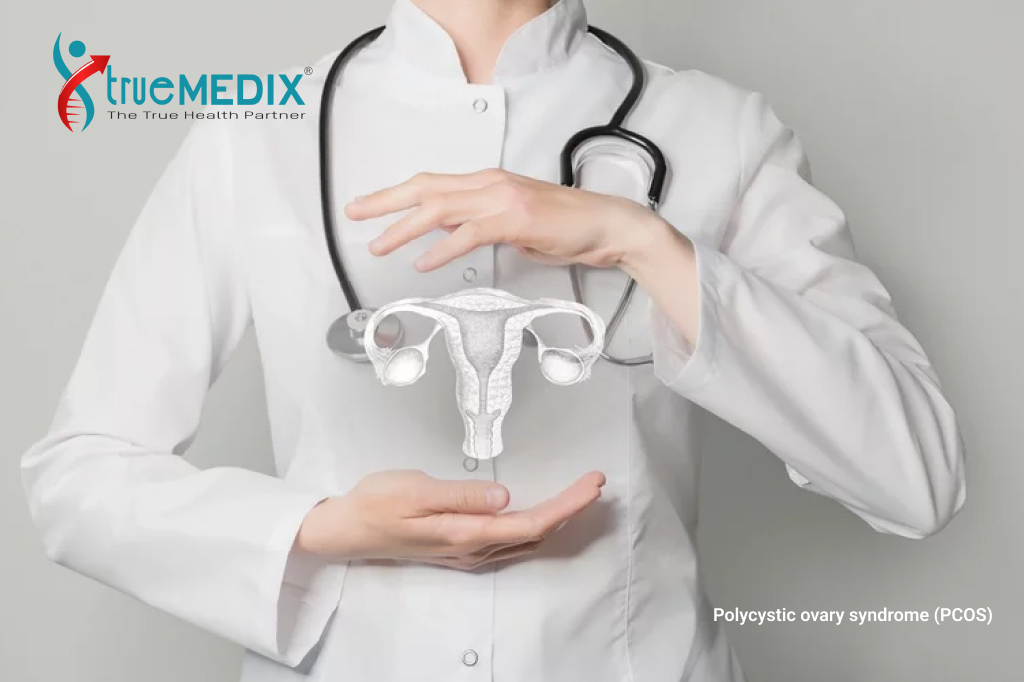
PCOD, also known as Polycystic Ovary Syndrome (PCOS), is a hormonal condition that affects women of reproductive age. It leads to hormonal abnormalities and the formation of tiny ovarian cysts.
PCOD/PCOS has an impact on reproductive health and metabolism, as well as an increased risk of diabetes and heart disease. It causes irregular periods and infertility and has a negative impact on overall wellness.
Common Symptoms Of PCOD/PCOS
Identifying PCOD/PCOS symptoms is important for early detection and treatment of the condition. While symptoms differ from person to person, some frequent warning signs to look for include:
Irregular Menstrual Periods:
Women with PCOD/PCOS commonly experience irregular or infrequent menstrual cycles, and may even have prolonged periods.
Excessive Hair Growth:
Excessive hair growth, known as hirsutism, may occur as a result of elevated androgen hormone levels in PCOD/PCOS.
Acne And Oily Skin:
Hormonal imbalances can cause acne and oily skin in individuals with PCOD/PCOS.
Weight Imbalance:
Many PCOD/PCOS women struggle with weight control, frequently reporting unexplained weight gain or difficulties decreasing weight.
Mood Swings:
Hormonal shifts caused by PCOD/PCOS can have an effect on a person’s mood and cause emotional distress.
Infertility:
PCOD/PCOS is the most common cause of female infertility since it can disrupt the ovulation process.
Available Treatment Options
PCOD/PCOS treatment aims to manage symptoms, restore hormonal balance, and limit the risk of complications. Several treatment strategies may be offered depending on the severity of the condition like:
Lifestyle Modifications
Adopting a healthy lifestyle can help with PCOD/PCOS management. This includes regular exercise, a well-balanced diet, stress management, adequate sleep, and abstaining from smoking and excessive alcohol intake.
Medications & Fertility Treatments
In certain cases, healthcare providers may prescribe medications such as hormonal contraceptives, anti-androgen drugs, or insulin-sensitizing agents to regulate menstrual cycles, prevent excessive hair growth, and manage other symptoms associated with PCOD/PCOS. In addition, for those experiencing infertility due to PCOD/PCOS, reproductive therapies such as ovulation induction, in vitro fertilization (IVF), or surgical interventions may be prescribed to address their specific needs.
Weight Management
Weight management habits such as exercise, dietary adjustments, and behaviour therapy can help improve symptoms of PCOD/PCOS since weight gain and challenges reducing weight are common.
Frequently Asked Questions (FAQs) About PCOD/PCOS
1. Are PCOD and PCOS the same thing?
PCOD is a condition in which the ovaries generate a large number of immature or partially mature eggs as a result of a bad lifestyle, obesity, stress, and hormonal imbalance. PCOS is a metabolic disease that can cause anovulation, which is when the ovaries cease producing eggs.
2. Can PCOD/PCOS be cured?
Although PCOD/PCOS is a chronic condition, it can be effectively managed by a combination of lifestyle changes, medications, and other treatments. While there is no known cure, proper care and attention to treatment regimens can assist individuals in living a healthy and full life.
3. Can PCOD/PCOS affect fertility? Yes, PCOD/PCOS is a major cause of female infertility. PCOD/PCOS can make it difficult for a woman to conceive naturally due to hormonal abnormalities and irregular ovulation. Many women with PCOD/PCOS can overcome infertility and achieve pregnancy with appropriate medical interventions and fertility therapies.
4. Is PCOD/PCOS only a reproductive disorder?
No, PCOD/PCOS impacts more than only the reproductive system; it can also have metabolic and cardiovascular implications. People with PCOD/PCOS are more likely to develop other health problems such as type 2 diabetes, high blood pressure, and heart disease. To reduce these risks, regular medical monitoring and proper care are required.
Women can effectively PCOD/PCOS by understanding it, recognizing the symptoms, obtaining an early diagnosis, and implementing suitable lifestyle changes and medications. Consult a healthcare expert for specific advice and support in properly managing PCOD/PCOS.
So, if any of you is looking for a better diagnosis, Truemedix is here to help you out and provide the best healthcare service.






